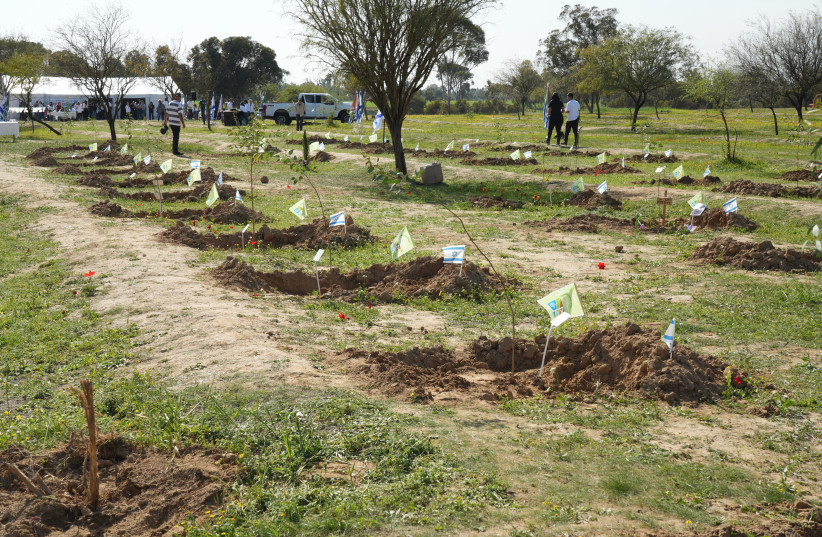To my Jewish brothers and sisters: Shalom.
My name is Alexander, and I had the honor of returning to Israel last week with an organization called Passages.
One of the most poignant parts of my trip occurred at Re’im, the Supernova music festival site where 364 people were murdered on the morning of October 7, 2023. Our group arrived at the hallowed ground after five in the afternoon. The last rays of an orange sun razored through the trees and across the field. Thick fog hung between the stone pines. Drizzle slipped down from the clouds. Miniature messengers from above.
Somewhere beyond the field came the thump of distant mortars and the screech of shells. A flurry of black smoke colored the evening sky.
We sauntered in silence through the makeshift memorial site, each of us anchored to the earth by the weight of grief. All around us, hundreds of steel fence posts held 8x10 portraits of the slain. A 23-year-old with his red surfboard; a 28-year-old with her cowgirl hat. Each of them smiling; each of them alive.

As we gazed at those temporary memorials, two women approached us and examined our blue t-shirts that stated, “Christians Stand with Israel.”
“Thank you for supporting us,” the older woman said. “Our grief is immense, but your presence means everything to us.”
“We’re honored to be here,” I said, as another woman in our group stepped forward and embraced her.
That scene reminded me of how the world admonishes us to let go of grief and to move on from it. Countless well-intentioned friends, family, and even strangers have recited the same clichés to me:
“Everything happens for a reason.”
“At least you didn’t lose both parents.”
“They’re in a better place.”
These platitudes are as unhelpful as they are outdated. And so is the zeal to relate to someone. After my father died, it seemed almost everyone wanted to tell me about a person they’d known who’d died. But this rarely helps someone feel heard, seen, or loved.
The Parisian woman I met at Re’im, who lost her son, had experienced the impossible weight of picking up the threads of an old life and starting again. I saw the sorrow in her eyes and heard the disbelief in her voice. But her vulnerability and courage to tell her story consoled me beyond measure.
Gift of grief
This is the gift of grief. It’s swapping stories and sharing tears. It’s celebrating our retained memories and lamenting what was stolen. It’s memories that haunt us and memories that heal us.
When my father left this world, people only ever spoke to me about his death in an oblique way. It may have been the circumstances or the general phobia surrounding death. But all I ever wanted was for someone to say that they were sorry for what had happened to us.
So please permit me to say, my dear Jewish and Israeli friends, I’m so sorry for what has happened to you, your families, and your communities. I’m sorry for each passing day without your beloved mothers and fathers, sons and daughters, nieces and nephews, friends and neighbors. I’m sorry for questions that have no answers and pain that has no end.
As we walked back to the bus, the valley swallowed the sun and candlesticks illuminated the portraits of 364 lives that were cut short. I think about how grief has taught me there’s no such thing as a finished life. We strive, we fail, and are done before we’ve even started. But somehow, someway, a broken heart keeps beating. That’s the surprising thing about loss – a part of you dies, like you expected it would, but another part of you lives, like you never expected it would.
So tomorrow, I hope you’ll tell the story of how they died, but the next day, I hope you’ll share the story of how they lived. It has been one of the greatest honors of my life to come back to Israel and listen to you, lament with you, and stand with you.
May the God who comforts the mourners of Zion and Jerusalem continue to strengthen, heal, and console you.
The writer is an associate at Kilpatrick Townsend & Stockton. He recently came to Israel on a solidarity mission with Passages, an organization that sends students from Christian universities to Israel for a transformative trip that puts students in touch with the biblical roots of their faith and introduces them to the modern State of Israel.
